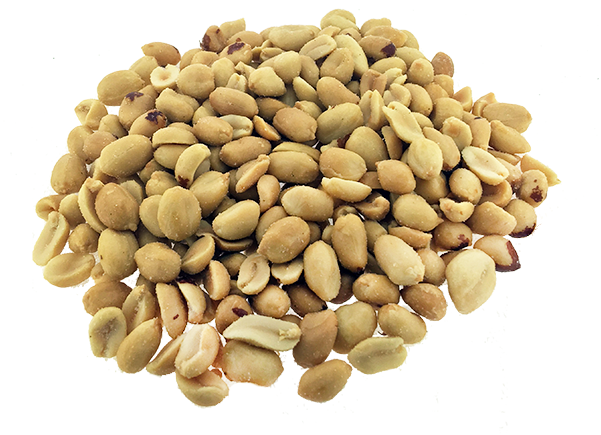Peanuts

Varieties Available
- Raw peanuts
- Roasted (no salt) peanuts
- Roasted salted peanuts
Jollies uses only US grown peanuts
Health benefits of peanuts
- Peanuts are rich in energy (567 calories per 100 g) and contain health-benefiting nutrients, minerals, antioxidants and vitamins that are essential for optimum health.
- They compose sufficient levels of mono-unsaturated fatty acids (MUFA), especially oleic acid. MUFA helps lower LDL or “bad cholesterol” and increases HDL or “good cholesterol” level in the blood.
- Peanut kernels are good source of dietary protein; composed of fine quality amino acids that are essential for growth and development.
- Research studies have shown that peanuts contain high concentrations of poly-phenolic antioxidants, primarily p-coumaric acid. This compound has been thought to reduce the risk of stomach cancer by limiting formation of carcinogenic nitrosamines in the stomach.
- Peanuts are an excellent source of resveratrol, another polyphenolic antioxidant. Resveratrol has been found to have protective function against cancers, heart disease, degenerative nerve disease, Alzheimer’s disease, and viral/fungal infections.
- Studies suggest that resveratrol may reduce stroke risk through altering molecular mechanisms in the blood vessels (reducing susceptibility to vascular damage through decreased activity of angiotensin, a systemic hormone responsible for blood vessel constriction that would elevate blood pressure), and by increasing production of vasodilator hormone, nitric oxide.
- Peanuts are an excellent source of vitamin E (a-tocopherol); containing about 8 g per100 g. vitamin E is a powerful lipid soluble antioxidant which helps maintain the integrity of cell membrane of mucus membranes and skin by protecting from harmful oxygen free radicals.
- Peanuts are packed with many important B-complex group of vitamins such as riboflavin, niacin, thiamin, pantothenic acid, vitamin B 6, and folates. 100 g of peanuts provide about 85% of RDI of niacin, which contribute to brain health and blood flow to brain.
- Peanuts are a rich source of minerals like copper, manganese, potassium, calcium, iron, magnesium, zinc, and selenium.
Just a handful of peanuts per day provides enough recommended levels of phenolic anti-oxidants, minerals, vitamins and protein.
Storage
Store in a cool dry place for up to 1 month. Refrigeration recommended. It is ok to freeze. Shelled peanuts can be thawed and refrozen as many times as necessary for up to 9 months without a loss of flavor or texture.
Nutritional information sources: nutrition-and-you.com, USDA National Nutrient data base
| Principle | Nutrient Value | Percentage of RDA |
|---|---|---|
| Energy | 567 Kcal | 29% |
| Carbohydrates | 16.13 g | 12% |
| Protein | 25.80 g | 46% |
| Total Fat | 49.24 g | 165% |
| Cholesterol | 0 mg | 0% |
| Dietary Fiber | 8.5 g | 22% |
| Vitamins | ||
| Folates | 240 µg | 60% |
| Niacin | 12.066 mg | 75% |
| Pantothenic acid | 1.767 mg | 35% |
| Pyridoxine | 0.348 mg | 27% |
| Riboflavin | 0.135 mg | 10% |
| Thiamin | 0.640 mg | 53% |
| Vitamin A | 0 IU | 0% |
| Vitamin C | 0 | 0% |
| Vitamin E | 8.33 mg | 55.5% |
| Electrolytes | ||
| Sodium | 18 mg | 1% |
| Potassium | 705 mg | 15% |
| Minerals | ||
| Calcium | 92 mg | 9% |
| Copper | 1.144 mg | 127% |
| Iron | 4.58 mg | 57% |
| Magnesium | 168 mg | 42% |
| Manganese | 1.934 mg | 84% |
| Phosphorus | 76 mg | 54% |
| Selenium | 7.2 µg | 13% |
| Zinc | 3.27 mg | 30% |
| Phyto-nutrients | ||
| Carotene-alpha | 0 µg | — |
| Crypto-xanthin-beta | 0 µg | — |
| Lutein-zeaxanthin | 0 µg | — |













